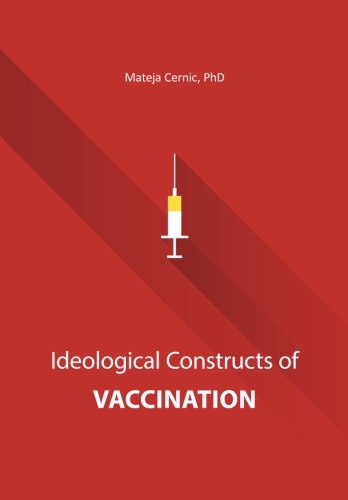Description
The book Ideological constructs of vaccination addresses, in evidence-based detail, the shakiness, dubiousness, frequently even falseness of the most common, self-evident and deeply rooted claims about vaccines – about their safety, efficacy, rigorous testing and regulation, etc. – thus depicting a disturbing image of states’ and scientific institutions’ operation. It is written by Mateja Cernic, PhD, and is based on the writer’s doctoral thesis with the same title. It is a much more extensive, complemented and updated version of the thesis. Vaccination is considered “the greatest achievement of medicine”. It is generally accepted that it is not only protected and beneficial for the population, but frequently also an urgent, necessary and justifiable measure which has to be implemented regardless of any potential doubts expressed by individuals subjected to it. The justification, legalization and implementation of vaccination, including compulsory vaccination, are based primarily on the following claims: * Vaccination has considerably reduced mortality from contagious diseases. * Vaccines are protected and efficient. * Adverse effects are rare, mild and temporary. * Vaccines do not cause illnesses and long-term damage to the body, particularly not autism. * A child can get any number of doses without any harm. * Adjuvants are protected and harmless. * Aluminum in vaccines is equivalent to aluminum in food. * Vaccination is the best protection against infections. * A sufficiently high level of antibodies guarantees protection against infections. * Vaccination is the cheapest and most efficient public-health measure. * Vaccines provide herd immunity which protects us against outbreaks of dangerous epidemic diseases. * Doctors know the properties of vaccines very well. * Adverse effects are meticulously monitored and recorded. * Vaccines are thoroughly tested in rigorous scientific studies. * Regulatory authorities keep a vigilant eye on the safety and adequacy of vaccines. Then again, a detailed analysis of these most common, self-evident and deeply rooted claims about vaccination shows that, in reality, they are ideological constructs, i.e. interest-based constructs of reality which prevail over other, different constructs because of enormous social, political and economic power which is at the back of them. In other words, a thorough analysis of the most common statements about vaccination used to justify and even codify mandatory mass vaccination reveals that they are shaky, dubious and frequently even false. The book Ideological constructs of vaccination is divided into two parts which complement and upgrade each other: * social aspects of medicine and vaccination * ideological constructs of vaccination In the first part, the writer, dr. Mateja Cernic, points out the socio-political aspects of vaccination, from the legal regulation of vaccination to discourses and ideologies. This part is important, as it enables readers to learn about vaccination policies and practices and helps them understand why there are such fierce battles between the supporters and opponents of vaccination. The second part, which specializes in ideological constructs of vaccination, represents the main body of the book, where the most common claims about vaccination are systematically analyzed. It presents, among other things, certain mechanisms through which vaccines influence an organism (e.g. damage the nervous system and the immune system). Quite a lot of attention is also dedicated to studies based on which vaccines are allocated marketing authorizations. All claims are systematically supported by references to scientific articles, government documents and official statistics. This book is intended for everyone who wishes to learn more about vaccination and looks for scientific proof. Above all, it is intended for those who, up to this point, have not dedicated special attention to vaccination, but have accepted it as a self-evident and non-problematic medical measure.













































